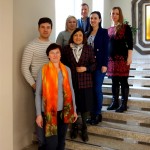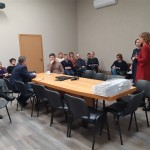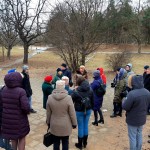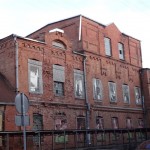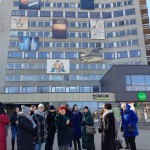Experience of Lithuanian municipalities in revitalisation of degraded areas
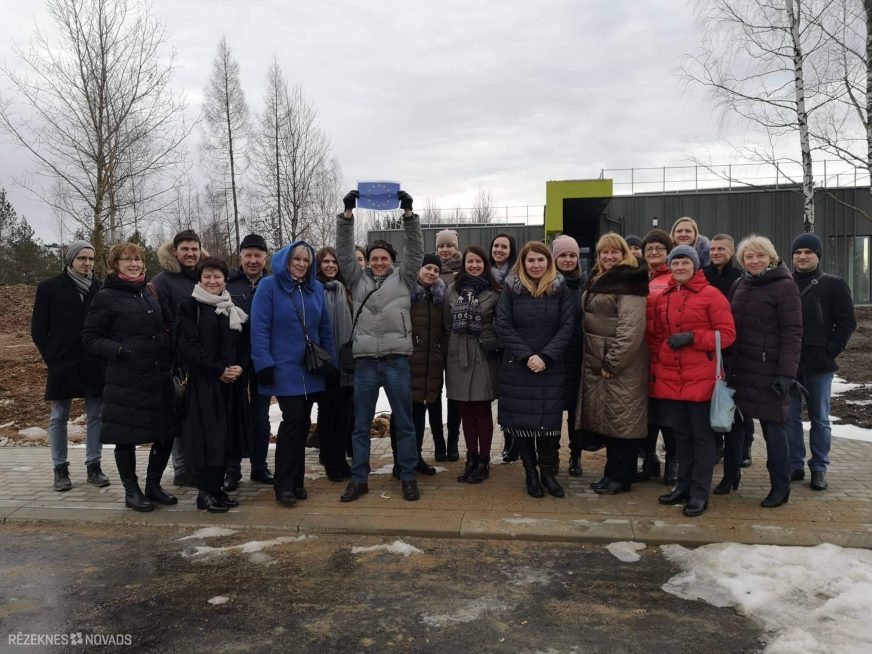
 At the end of February, the municipalities of Rezekne and Kraslava, Daugavpils City Municipality and Rēzekne Special Economic Zone Administration, together with representatives of the association Euroregion “Lakes Land”, went to a three-day study visit to Lithuania with a view to obtaining experience in planning the development of degraded areas in local governments. For the first two days of the trip, representatives of local governments and organisations met with the municipalities of the municipality of Penevee, but on the third day with the projects and future plans implemented by the municipality of Visaginas. The municipality of Paņevežas, which is the fifth largest in Lithuania (80 000), presented the main projects relating to the revitalisation of the urban environment: the first project involves the treatment of degraded areas contaminated by oil products and heavy metals, using special tree varieties whose effectiveness has been proven and which absorb harmful substances from the soil and neutralise them. In the area of 62,3 ha and where 186 600 trees were planted 6 years ago, soil monitoring is carried out which shows a reduction in pollution. The other project presented by the participants in the exchange of experience is in the municipality of Trans-Form. Within the framework of the project, the Skaistakalnis Park area, which had previously been a military base confined to the fence, will be converted into an attractive and open park with the necessary infrastructure (Green area, flower gardens, small infrastructure elements and area lighting) – it also contributes to the development of creative industries already active in the area, such as the Glass Remis glass art studio. The third project is the creation of the art centre Stasys, the honorary world-famous artist/ilustrator, Stasys Eidrigevicius. The coordinator of the municipal projects presented the visualisation the process and evaluation criteria to select not the cheapest but most appropriate option. Similarly, the participants of the trip were also introduced to the Paneveja Special Economic Area, which is one of the largest in Lithuania, and the most competitive. Its main investors are Norwegian, German and French companies currently holding 19 ha of total available 47 ha. The Zone Administration is a private company that gives greater operational and development opportunities. The area attracts potential investors in three ways: 1) through contact search and communication via e-mail and telephone calls, as the potential investor must be able to interest in the first 60 seconds; 2) by participating in various exhibitions/fairs, which, according to the employee of the zone, are very expensive but necessary to advertise the area's offer and establish contacts; 3) paying attention to local businesses and offering their services to those who grow up and want to expand. Visiting the Visaginas Municipality (18,000 people) was able to meet a fairly specific city. The city of Visaginas was designed to ensure the operation of the Ignalina nuclear power plant, where 5000 of the city's population worked before its closure in 2010. At the time of the closure process, it is maintained by only 2000 employees and will be gradually reduced. The city faced a large economic impact and the departure of the population. Currently there are several production companies in the city that are active in wood processing, textile industry, etc., but the local government is interested in actively developing and supporting entrepreneurship, for example by creating Smart Park, where the degraded area is cleaned and provided with communications and offshore buildings to attract potential investors. Local government also contributes to sports and recreational infrastructures whereas people are actively engaged in sport in this city. As part of the Trans-Form project, the Municipality of Visaginas develops the technical documentation for the demolition works of the former school building to transform the exempted area into a green area of the city. Main lessons learnt:
At the end of February, the municipalities of Rezekne and Kraslava, Daugavpils City Municipality and Rēzekne Special Economic Zone Administration, together with representatives of the association Euroregion “Lakes Land”, went to a three-day study visit to Lithuania with a view to obtaining experience in planning the development of degraded areas in local governments. For the first two days of the trip, representatives of local governments and organisations met with the municipalities of the municipality of Penevee, but on the third day with the projects and future plans implemented by the municipality of Visaginas. The municipality of Paņevežas, which is the fifth largest in Lithuania (80 000), presented the main projects relating to the revitalisation of the urban environment: the first project involves the treatment of degraded areas contaminated by oil products and heavy metals, using special tree varieties whose effectiveness has been proven and which absorb harmful substances from the soil and neutralise them. In the area of 62,3 ha and where 186 600 trees were planted 6 years ago, soil monitoring is carried out which shows a reduction in pollution. The other project presented by the participants in the exchange of experience is in the municipality of Trans-Form. Within the framework of the project, the Skaistakalnis Park area, which had previously been a military base confined to the fence, will be converted into an attractive and open park with the necessary infrastructure (Green area, flower gardens, small infrastructure elements and area lighting) – it also contributes to the development of creative industries already active in the area, such as the Glass Remis glass art studio. The third project is the creation of the art centre Stasys, the honorary world-famous artist/ilustrator, Stasys Eidrigevicius. The coordinator of the municipal projects presented the visualisation the process and evaluation criteria to select not the cheapest but most appropriate option. Similarly, the participants of the trip were also introduced to the Paneveja Special Economic Area, which is one of the largest in Lithuania, and the most competitive. Its main investors are Norwegian, German and French companies currently holding 19 ha of total available 47 ha. The Zone Administration is a private company that gives greater operational and development opportunities. The area attracts potential investors in three ways: 1) through contact search and communication via e-mail and telephone calls, as the potential investor must be able to interest in the first 60 seconds; 2) by participating in various exhibitions/fairs, which, according to the employee of the zone, are very expensive but necessary to advertise the area's offer and establish contacts; 3) paying attention to local businesses and offering their services to those who grow up and want to expand. Visiting the Visaginas Municipality (18,000 people) was able to meet a fairly specific city. The city of Visaginas was designed to ensure the operation of the Ignalina nuclear power plant, where 5000 of the city's population worked before its closure in 2010. At the time of the closure process, it is maintained by only 2000 employees and will be gradually reduced. The city faced a large economic impact and the departure of the population. Currently there are several production companies in the city that are active in wood processing, textile industry, etc., but the local government is interested in actively developing and supporting entrepreneurship, for example by creating Smart Park, where the degraded area is cleaned and provided with communications and offshore buildings to attract potential investors. Local government also contributes to sports and recreational infrastructures whereas people are actively engaged in sport in this city. As part of the Trans-Form project, the Municipality of Visaginas develops the technical documentation for the demolition works of the former school building to transform the exempted area into a green area of the city. Main lessons learnt:
- The priority of the municipality of Paņevežas is to preserve natural values in the urban environment, promote the attractiveness of these areas to visitors and apply to the development of entrepreneurship. The Paņeveža is a region that has seen its potential in foreign investors in recent years and attracts EU funding to infrastructure projects for business and tourism development.
- Overall, the development projects of the degraded areas of Paņevežas are quite impressive and united in the common development vision – to develop the Green Area along the Nevada River with various tourist attractions. As the project coordinator informed, the local government, in the previous programming period OF EU funds, used the available funding fairly, which in turn has changed dramatically during this period – the municipality often finances projects in THE amount OF 50% (10-15%), whereas the quality of projects and materials has been set for the purpose.
- Although 9 project managers are working in the municipality of Punevee, the local government employs an additional professional project management team that deals directly with the development of major infrastructure projects and the submission of applications. When the project is already started, it is transferred to local government specialists. It was also very interesting that the attached project manager was working twice a week in Paņeveja, while the remaining three working days were distant because they live in Vilnius. It can be concluded that such a working schedule is quite effective if it is necessary to attract different types of high-class professionals that may not be located in the local government.
- In the city of Paņevežas, a large emphasis is placed on the involvement of the population. In order to involve residents in the development of the urban environment, the “Community Garden” or a garden created by the population will be created within a specially allocated zone within the “Trans-Form” project, where each lead will be given its own plot of land that it will be able to process and install.
- As it has been concluded, by visiting the Procurement Special Economic Area, such an area, even with tax discounts and well-equipped infrastructure, is not in itself capable of attracting investors – the city's potential and the available resources (especially human resources) are determinative. A representative of the zone also acknowledged that after attracting the first Norwegian investor, the area attracts greater confidence in future investors.
- The functionality of infrastructure objects is very important. While visiting the art gallery, the Project Coordinator also acknowledged that it was not always smooth to implement the project. As an example, the expansion project of the exhibition room of the gallery was mentioned – construction was built, but the architect of the structure did not take into account the specific requirements and functionality of the exhibition room. A Lifts is set up in the centre of the exhibition room, which makes it insufficient for the deployment of functional exhibits. It was both concluded that a very good lesson could also be made from errors, so that there is a particular emphasis on their functionality when building infrastructure projects.
- An interesting project was implemented in the municipality of Visaginas, transforming the closed secondary school building into a cultural centre. In most of the former school rooms, cosmetic repairs have been carried out with EU fund support and currently facilities are provided to 38 different collectors from across the city, showing that existing infrastructure can be improved and effectively used for other purposes.
The implementation of projects in both Latvian and Lithuanian municipalities is very topical in order to be able to promote local government development and access to services for residents and tourists. The knowledge and experience gained will serve as a result of continuing and planning development projects in the future and developing cooperation with Lithuanian partners.
Project LLI-386 Trans-Form is implemented within the framework of Interreg V-A Latvia - Lithuania programme 2014-2020. European Regional Development Fund (ERDF) funding for the project: 442 296.58 EURO.
Cynthia Batare, project coordinator in the municipality of Rezekne
The content of this publication is fully the responsibility of the municipality of Rēzekne and is in no circumstances considered to be the official position of the European Union. Program website: www.latlit.eu Official EU website: www.europa.eu
